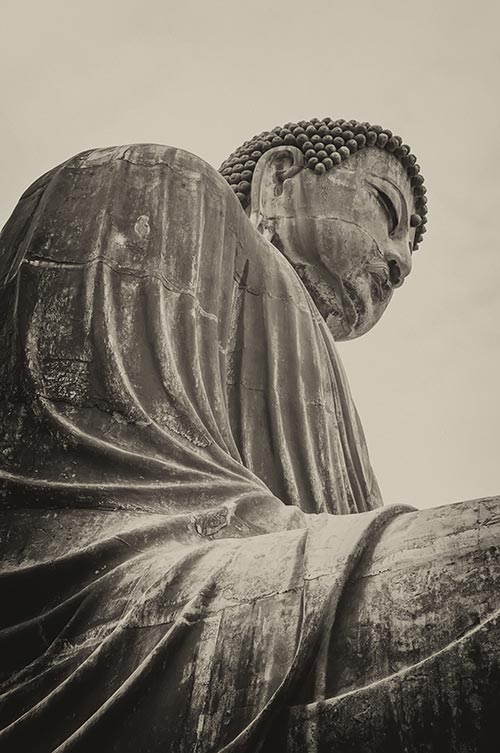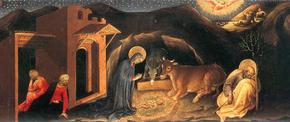The views expressed in our content reflect individual perspectives and do not represent the official views of the Baha'i Faith.
Those of us who grew up in religious families often carry within us a mental image of our savior – to whom we are, hopefully, drawing near.
To me, for years, it was the face of Christ and the hope of winning His good pleasure that became the driving force in my religious life. I never once thought of this as troublesome, until I overheard a Hindu explain that Christians bow down all the time before idols in their churches, the images of Jesus and the saints. Buddhists of course, have their own images. They turn to the Buddha for refuge; and in some forms of Buddhism, to one of the many Bodhisattvas. Hindus worship before some manifestation of Brahman, for example: Krishna, Rama, Shiva, or some form of the Goddess. Clearly, we have too many gods in our cupboards.
These forms limit us, and they limit our spirits. Because the mentally-conjured face of God varies from person to person, and from time to time and place to place, the result is a host of varying physical and mental images that then become the differing objects of our devotions. Does our attraction to these different images bring us unity, or are they a form of self- and socially-constructed idol worship that divides us?
 Before we can find the part of God that is unchanging, we must figure out that we’ve adopted socially-conditioned and changeable gods. We must learn the importance not of the particular image we’ve adopted, but of what lies behind and beyond the image. We need to focus not on just the face, as it were, of our chosen god – but instead on what we see in God’s eyes. It is through this wondrous portal that we have found a window to God. It is through the love radiating from deep within the prophet’s pupils that we have found the strength to believe and accept God’s teachings. Rather than attaching ourselves to any particular image, we must become attached to this unchanging Reality, this deep and profound love, this Creative Force of the universe.
Before we can find the part of God that is unchanging, we must figure out that we’ve adopted socially-conditioned and changeable gods. We must learn the importance not of the particular image we’ve adopted, but of what lies behind and beyond the image. We need to focus not on just the face, as it were, of our chosen god – but instead on what we see in God’s eyes. It is through this wondrous portal that we have found a window to God. It is through the love radiating from deep within the prophet’s pupils that we have found the strength to believe and accept God’s teachings. Rather than attaching ourselves to any particular image, we must become attached to this unchanging Reality, this deep and profound love, this Creative Force of the universe.
Jews, Muslims and Baha’is discourage drawing any depiction of God or worshiping the prophet. Yes, the founders of religion must be revered. After all, the foundations of society have always rested upon their teachings and the example of their lives — but their revelation of God’s love and teachings are what make them holy. God’s attributes have no human face. They shine through the same dark pupil of every prophet of God, and they call to every soul equally. This is the unchanging part of the face – and Faith — of God.
In the great Faiths of the past, depictions of Moses or Abraham or Krishna or Buddha or Christ, by definition, came from artists who tried to capture their essence. But that effort usually failed, and gradually people inevitably made idols out of those depictions, forgetting that their essence and their spiritual qualities made them important, not their physical beings. For that reason, Baha’is don’t keep or display pictures of Baha’u’llah. Instead, the Baha’i teachings ask Baha’is to center their prayers and devotions on developing the inner qualities – love, kindness, generosity, service to others, etc. — that make up a truly spiritual life.
If we cling too much to the face of a prophet, if we hold on to his body or his image or his name, we are making a mistake. Jesus once spoke of those who believed passionately in him saying:
Not every one that saith unto me, Lord, Lord, shall enter into the kingdom of heaven; but he that doeth the will of my Father which is in heaven.
Many will say to me in that day, Lord, Lord, have we not prophesied in thy name? and in thy name have cast out devils? and in thy name done many wonderful works?
And then will I profess unto them, I never knew you: depart from me, ye that work iniquity. – Matthew 7:2123
It is not allegiance to the face, nor the body, nor the name of a Chosen One that determines our destiny. It is our attraction to God’s love and our determination to respond to his invisible will. When we find this unchanging love, then we can hear the new teachings, and that will help us advance.

















Comments
Sign in or create an account
Continue with Facebookor